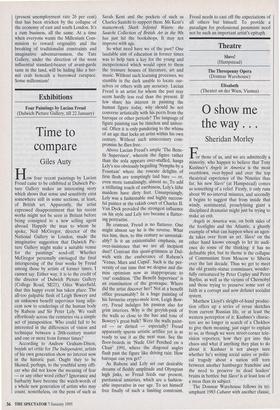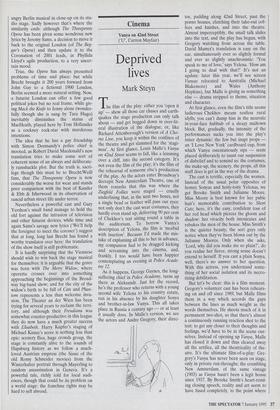Theatre
Slays!
(Hampstead) The Threepenny Opera (Donmar Warehouse) Elisabeth (Theater an der Wien, Vienna)
0 show me the way . . .
Sheridan Morley
or those of us, and we are admittedly a minority, who happen to believe that Tony Kushner's Angels in America is the most overblown, over-hyped and over the top theatrical experience of the Nineties thus far, his new Slays! (at Hampstead) comes as something of a relief. Firstly, it only runs about 90 no-interval minutes, and secondly it begins to suggest that from inside that windy, sentimental, proselytising giant a disciplined dramatist might just be trying to make an exit.
Angels in America was, on both sides of the footlights and the Atlantic, a ghastly example of what can happen when an agen- da takes over from an art. Slays! on the other hand knows enough to let its audi- ence do some of the thinking: it has no definable plot, but its theme is the collapse of Communism from Moscow to Siberia over the last decade. Thus we get to meet the old granite-statue commissars, wonder- fully caricatured by Peter Copley and Peter Bayliss, as well as the victims of Chernobyl and those trying to preserve some sort of faith in a corrupt and now defunct socialist system.
Matthew Lloyd's sleight-of-hand produc- tion offers up a series of revue sketches from current Russian life, or at least the western perception of it: Kushner's charac- ters are no longer in search of a Chekhov to give them meaning, just eager to explain to us, as though we were street-corner tele- vision reporters, how they got into this chaos and what if anything they plan to do about it. Kushner is not always sure whether he's writing social satire or politi- cal tragedy about a nation still torn between another hamburger franchise and the need to preserve its dead leaders' brains in bottles: but Slays! is at least less of a mess than its subject.
The Donmar Warehouse follows its tri- umphant 1983 Cabaret with another classic, angry Berlin musical in close-up on its stu- dio stage. Sadly however that's where the similarity ends: although The Threepenny Opera has been given some wondrous new lyrics by Jeremy Sams, a decision to move it back to the original London (of The Beg- gar's Opera) and then update it to the Coronation of 2001 leads, in Phyllida Lloyd's agile production, to a very uncer- tain mood.
True, the Opera has always presented problems of time and place: but while Brecht brought it 200 years forward from John Gay to a fictional 1900 London, Berlin seemed a more natural setting. Now, a futurist London can offer a few good political jokes but no real frame, while giv- ing Mack the Knife to Jenny alone (wonder- fully though she is sung by Tara Hugo) inevitably diminishes the status of MacHeath, played here by Tom Hollander as a cockney rock-star with murderous intentions.
The idea that he has a gay friendship with Simon Dormandy's police chief is mooted, as Robert David Macdonald's new translation tries to make some sort of coherent sense of an always and deliberate- ly ramshackle plot. But the truth is, sacri- lege though this must be to Brecht/Weill fans, that The Threepenny Opera is now considerably the worse for wear and stands poor comparison with the best of Kander & Ebb & Isherwood in its observation of rancid urban street life under terror.
Nevertheless a powerful cast and Gary Yershon's small band manage to hold the old fort against the intrusion of television and other futurist devices, while time and again Sams's savage new lyrics ('We'll help the foreigner to meet the coroner') suggest that at long, long last Brecht has found a worthy translator over here: the translation of the show itself is still problematic.
It is hardly surprising that the Viennese should wish to win back the stage musical for themselves: it is arguable that the genre was born with The Meny Widow, where operetta crosses over into something approaching the beginnings of the Broad- way big-band show; and for the city of the widow's birth to be full of Cats and Phan- tom represents a less than welcome inva- sion. The Theater an der Wien has been trying for several years to reclaim the terri- tory, and although their Freudiana was somewhat counter-productive in this league they do now have a much greater success with Elisabeth. Harry Kupfer's staging of Michael Kunze's score is nothing less than epic: scenery flies, huge crowds group, the stage is constantly alive to the sounds of Hapsburg history as we follow a much- loved Austrian empress (the Sissie of the old Romy Schneider movies) from the Winterhalter portrait through Mayerling to random assassination in Geneva. It's a powerful tale, richly told for local audi- ences, though that could be its problem on a world stage: the franchise rights may be hard to sell abroad.



















































 Previous page
Previous page